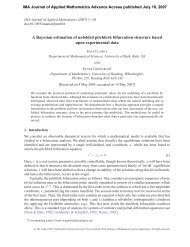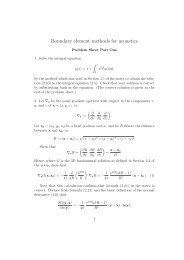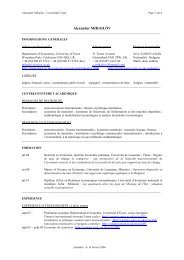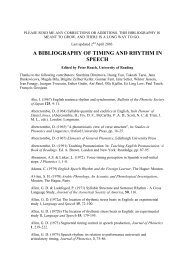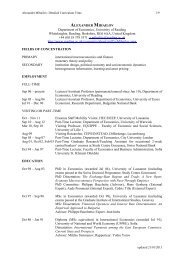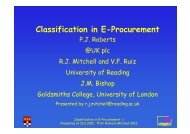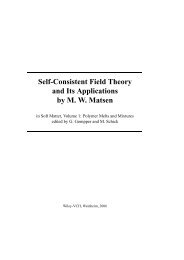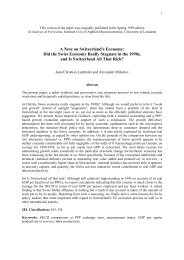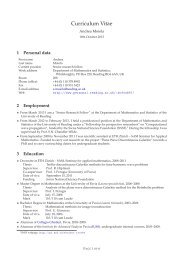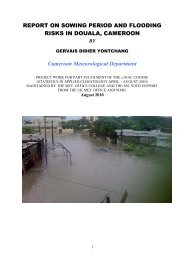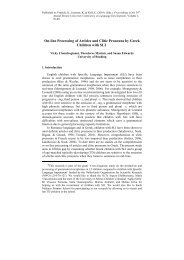Reading Working Papers in Linguistics 4 (2000) - The University of ...
Reading Working Papers in Linguistics 4 (2000) - The University of ...
Reading Working Papers in Linguistics 4 (2000) - The University of ...
Create successful ePaper yourself
Turn your PDF publications into a flip-book with our unique Google optimized e-Paper software.
LEXICAL AND GRAMMATICAL DEFICITS IN SLI<br />
All the matches scored above 85%, but five <strong>of</strong> the SLIs <strong>in</strong> the [+LD] group<br />
and four <strong>of</strong> those <strong>in</strong> [-LD] group (Figure 2) scored below 60%. <strong>The</strong> means for<br />
the two SLI groups are almost identical, close to 63%:<br />
Table 2: Group mean percent correct on reg. Past Tense realisation<br />
SLI [+LD] Past Tns<br />
LN matches <strong>of</strong> [+LD]s<br />
63.4 95.5<br />
63.5<br />
SLI [-LD]<br />
matches <strong>of</strong> [-LD]s<br />
62.5 98.0<br />
<strong>The</strong> lexical deficit clearly fails to predict performance on regular past tense,<br />
considered to be a key <strong>in</strong>dicator <strong>of</strong> grammatical deficit. <strong>The</strong> implications <strong>of</strong><br />
this f<strong>in</strong>d<strong>in</strong>g will be discussed below.<br />
Other vulnerable areas <strong>of</strong> grammar <strong>in</strong> grammatical impairment (Loeb &<br />
Leonard 1991) are null subjects and pronoun case. Even adults sometimes<br />
ellipt subjects <strong>in</strong> f<strong>in</strong>ite clauses (cf. Schelletter 1990), so a null subject score <strong>of</strong><br />
up to 5% was not taken as an <strong>in</strong>dicator <strong>of</strong> a grammatical deficit. However,<br />
only two <strong>of</strong> the SLI children with a LD showed null subjects with a frequency<br />
<strong>of</strong> over 5% and with the SLI children with no lexical deficit the same was<br />
found. Pronoun case errors, where a child used the object form <strong>of</strong> a pronoun<br />
<strong>in</strong> a nom<strong>in</strong>ative case context were rare <strong>in</strong> both SLI groups.<br />
Thus the hypothesis derived from Locke that the [+LD] children with<br />
SLI would show a pattern <strong>of</strong> much more severe grammatical deficits than the<br />
[–LD] group was not upheld. What we found <strong>in</strong>stead is a dissociation<br />
between widespread problems with past tense forms, and generally correct<br />
performance on pronoun forms and obligatory subjects, a result which <strong>in</strong> fact<br />
raises questions as to the account <strong>of</strong> grammatical SLI as an extended optional<br />
<strong>in</strong>f<strong>in</strong>itive phase (Rice, Wexler & Cleave 1995) which cannot be pursued here<br />
for reasons <strong>of</strong> space. However, it should be noted that the four children with<br />
frequent null subjects were among those with the lowest past tense realisation,<br />
an association predicted by the optional <strong>in</strong>f<strong>in</strong>itive account.<br />
We move on now to the other issue that <strong>in</strong>vestigated <strong>in</strong> this research.<br />
Was verb argument structure performance associated with a lexical deficit? In<br />
order to answer this question, rather than compar<strong>in</strong>g SLI groups with their<br />
matches, we need to compare the performance <strong>of</strong> the two SLI groups directly.<br />
55



